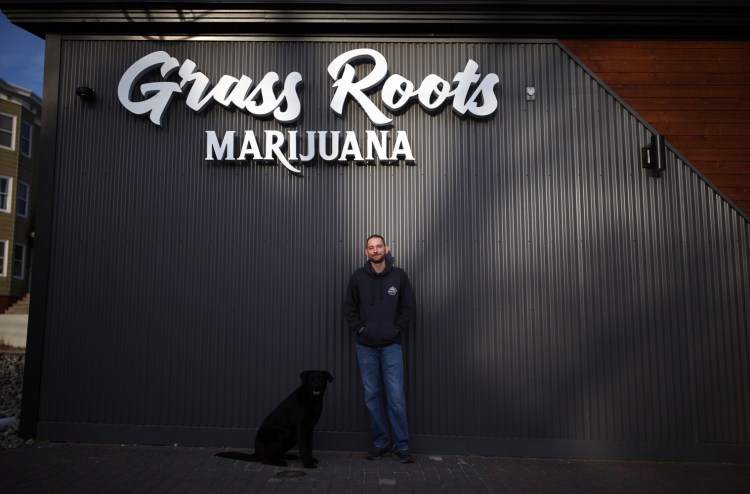SeaWeed Co. and Grass Roots Marijuana Shop may be the first two retail marijuana stores to get the green light to open up shop in Portland, but they won’t be the last.
According to Jessica Hanscombe, the city’s acting director of permitting and inspections, there are 31 other adult-use marijuana shops awaiting permit approval.
Most of those, if not all, should be open by November, she said, with a flurry expected within the next few weeks.
The city has also received five applications for medical marijuana storefronts and has so far approved one: Higher Grounds, a medical cannabis coffee house on Wharf Street, which opened on Wednesday.
The market launch may mean a farewell to one of the state’s eight medical marijuana dispensaries.
Wellness Connection of Maine, the state’s largest purveyor of medical cannabis, has applied to relicense its dispensary at 685 Congress St. as a recreational store. The dispensary has been open for nine years. The zoning board of appeals is expected to take up the issue on Thursday.
Only one or two applications have been denied, Hanscombe said.

SeaWeed Co. co-owners Kaspar Heinrici and Scott Howard inside their new location in Portland on Thursday. The owners and their team spent the day working to finish getting the space ready for Friday’s opening. Brianna Soukup/Staff Photographer
There are currently 59 cannabis-related applications pending for businesses including retail stores, testing facilities and manufacturing sites.
Portland’s first adult-use testing lab and the state’s second, Nova Analytics, opened in January.
The first adult-use cannabis store to receive approval, SeaWeed, opened its doors on Friday, a day owner Scott Howard said has been “a very long time coming.”
Despite its apparently widespread approval of legal cannabis – city voters approved the legalization of recreational marijuana by a 2-to-1 margin in a statewide referendum in 2016 – Portland has been slow to adopt regulations.
The rollout of the city’s recreational market comes roughly five months after the statewide recreational cannabis market launch and more than two years after local officials first started work on the ordinance.
It hasn’t been an easy road.

From left, social media manager Joscelyn Pizzino, human resources manager Danielle Capozza, and retail manager Margaret D’Amour at SeaWeed Co.’s new location in Portland off of Marginal Way on Thursday. The team is working to get the space ready for Friday’s opening. Brianna Soukup/Staff Photographe
The Portland City Council initially decided to adopt a 20-store cap as a way for Portland to enter the marijuana market in a slow, controlled manner and lower the risk of flooding the new market with more suppliers than needed. A market failure would hurt everyone, they argued.
Officials planned to select those 20 retail licensees based on a scoring matrix that gave preference to Mainers, the economically disadvantaged, business owners, medical cannabis caregivers, those with $150,000 in the bank, and companies that pay a living wage or donate 1 percent of profits to the city for drug prevention. The 20 highest-scoring applicants would nab a shop license.
However, a federal judge later ruled that the licensing system unfairly discriminated against out-of-state applicants.
In October, the council voted to temporarily scrap the 20-store cap and instead license almost everyone who applied in the first round of licensing, so long as they meet the city’s general eligibility requirements.
A month later, Portland residents voted to eliminate the retail cap permanently and shrink the mandatory buffer between licensed marijuana retail stores from 250 feet to just 100 feet.
Both changes will allow for a lot more stores, Hanscombe said.
For the most part, applications will be approved (or denied) on a first-come, first-served basis. The city does still have a point system in place, but it will only be used in the unlikely scenario that two businesses apply at the exact same time for a license within 100 feet of each other.
Hanscombe said she is proud of the work her team has done to launch the program, especially during a pandemic.
“In the years I’ve been doing this, we’ve adopted different ordinances, but this is the first that’s so expansive,” she said. “We hope to be a city every other city can look to for the best way to do this.”
Maine’s recreational market has brought in $9.29 million in revenue since launching in October. Sales have been increasing month over month, with just over $2.5 million in sales in February. Cash from the more than 35,000 sales transactions generated more than $250,000 in state sales tax revenue.
Send questions/comments to the editors.




Comments are no longer available on this story